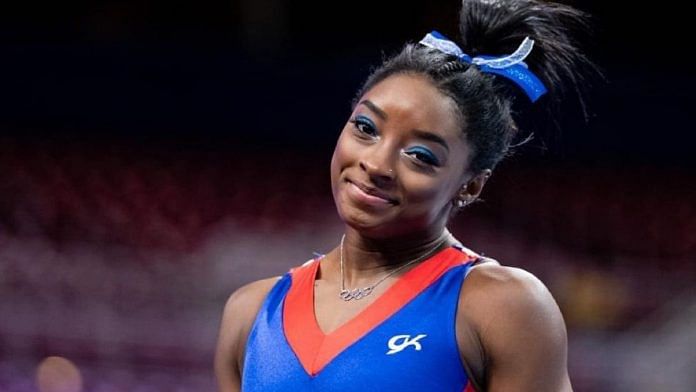
New Delhi: US gymnast Simone Biles Tuesday withdrew from two gymnastics finals during the ongoing Tokyo Olympics, citing her mental health and the need to protect “her body and mind”.
This was after she received her lowest Olympic score on the vault due to an awkward landing in the women’s artistic all-around team final against the Russian Olympic Committee.
She briefly left the venue and did not participate in the remainder of the final round, but returned to the sidelines to cheer on her teammates, as they won the silver medal while ROC took the gold.
In an interaction with journalists early Tuesday, Biles, an Olympic gold-medallist, had said that she was “having a little bit of the twisties”, which is a mental health condition that specifically affects gymnasts.
What are ‘twisties’?
According to Health magazine, the term ‘twisties’ is informal and gets its name from the aerial twisting skills gymnasts perform, a phenomenon whose biomechanics are yet to be fully studied and understood.
The condition can either be caused on a mental level by stress and anxiety or on a physical level by focal dystonia, which causes “involuntary muscle spasms” if muscles are overused, mental performance coach Jamie Shapiro was quoted as saying in Health.
‘Twisties’ is described as a mental block by gymnasts, which causes them to lose spatial awareness while performing, thereby losing control of their body. There is a disconnect between the body and mind in this condition and leads to disorientation.
As a result, it can cause the gymnast to either fail to complete their movements or suffer falls and awkward landings, risking serious and potentially career-threatening injuries.
‘Twisties’ also affect a gymnast’s ability to correctly execute moves that they had been practising and landing perfectly for years
While Biles had not suffered injuries during her vault performance in the artistic all-around team final, the fact that she was suffering from ‘twisties’ meant that there was significant risk of injury.
The condition is common in the sport but the time it lasts and the recommended treatment vary from gymnast to gymnast.
Shapiro makes numerous suggestions to recover from it — visualising the action, focusing on a different gymnastics skill, and visiting a sports psychologist.
Biles is also not the only high-profile gymnast to have been affected by the twisties. Retired US gymnast Aleah Finnegan tweeted that she has been suffering from the condition since she was 11 years old.
— aleah (@aleahfinn) July 28, 2021
Twisties vs yips
The impact of a gymnast’s mental block bears similarities to the yips, a term commonly used in golf but also for specific types of players in cricket and baseball.
The yips are involuntary wrist spasms caused by focal dystonia, much like the ‘twisties’.
In golf, this condition impacts the golfer’s ability to putt effectively, one of the most fundamental tasks in the sport, and was found to have affected 33 to 48 per cent of golfers, according to research conducted by Mayo Clinic, a US-based academic medical centre.
In cricket, the yips primarily affect bowlers and have historically impacted them in different ways, from causing them to bowl wides repeatedly to failing to complete their bowling action.
One of the most infamous cases of bowling yips happened to former county cricketer Scott Boswell in 2001.
In baseball, the yips affect the players’ ability to strike, pitch or catch the ball. It has affected several players throughout the history of Major League Baseball such as Washington Nationals pitcher Jon Lester and Red Sox’s Daniel Bard.
(Edited by Rachel John)
Subscribe to our channels on YouTube & Telegram
Why news media is in crisis & How you can fix it
India needs free, fair, non-hyphenated and questioning journalism even more as it faces multiple crises.
But the news media is in a crisis of its own. There have been brutal layoffs and pay-cuts. The best of journalism is shrinking, yielding to crude prime-time spectacle.
ThePrint has the finest young reporters, columnists and editors working for it. Sustaining journalism of this quality needs smart and thinking people like you to pay for it. Whether you live in India or overseas, you can do it here.